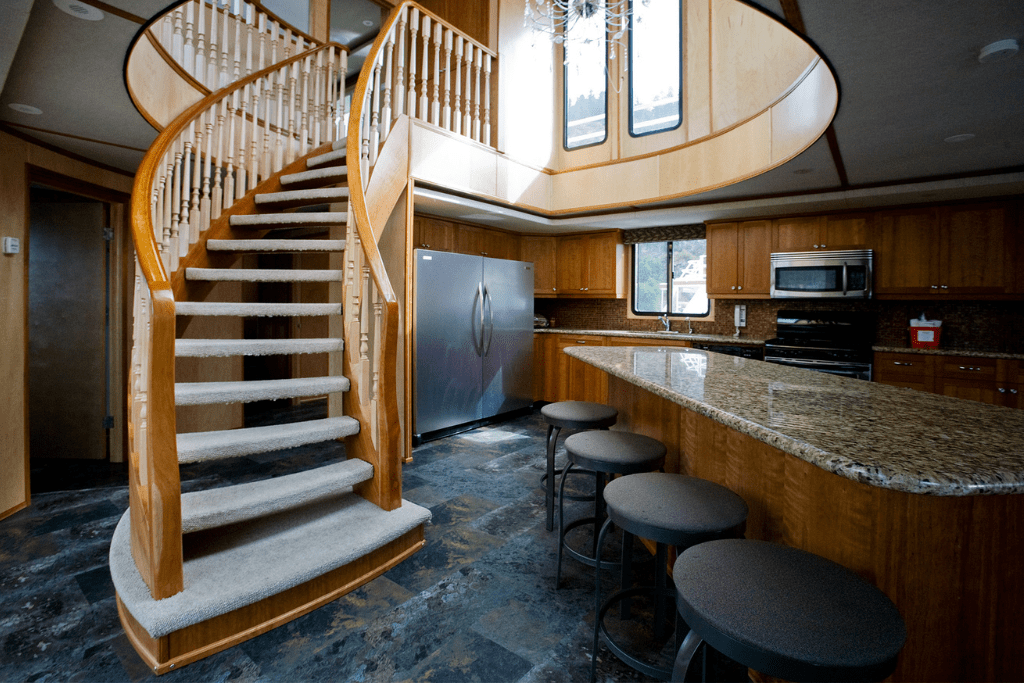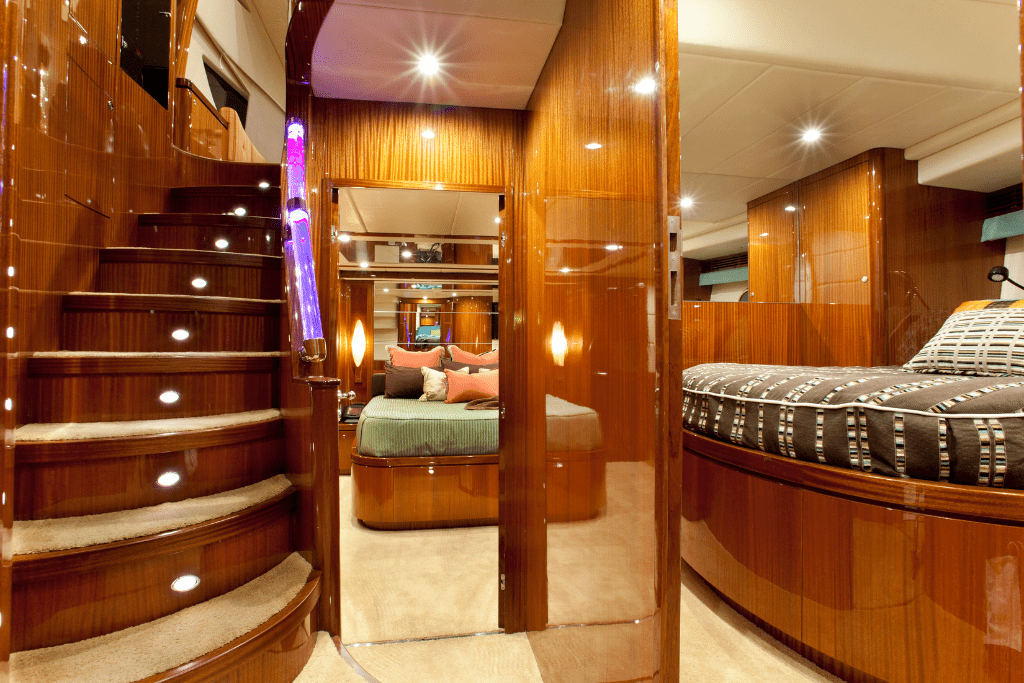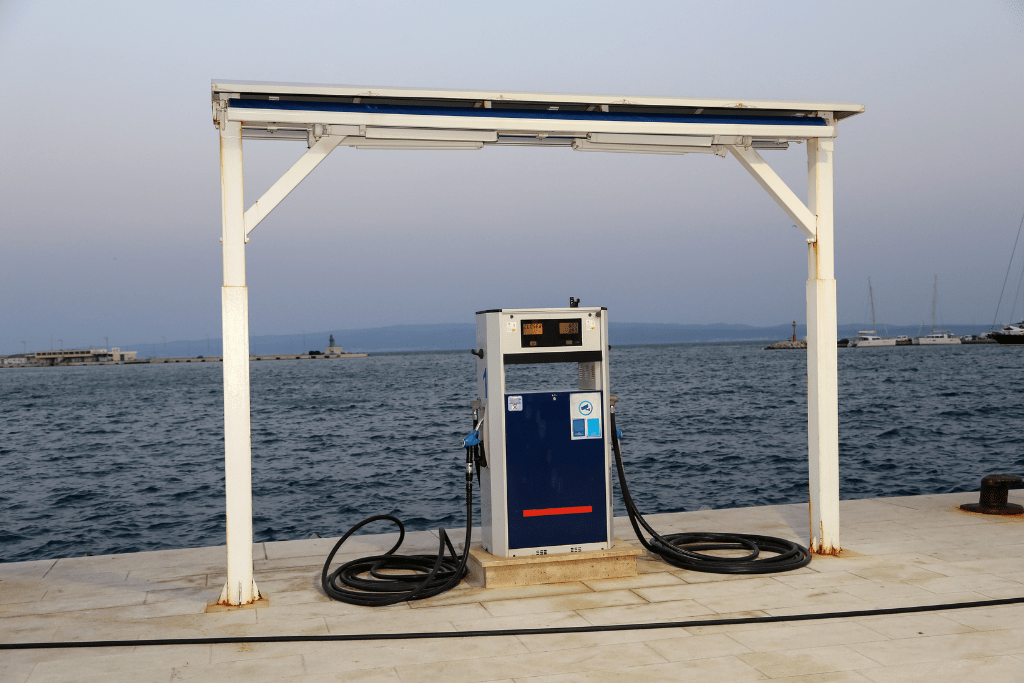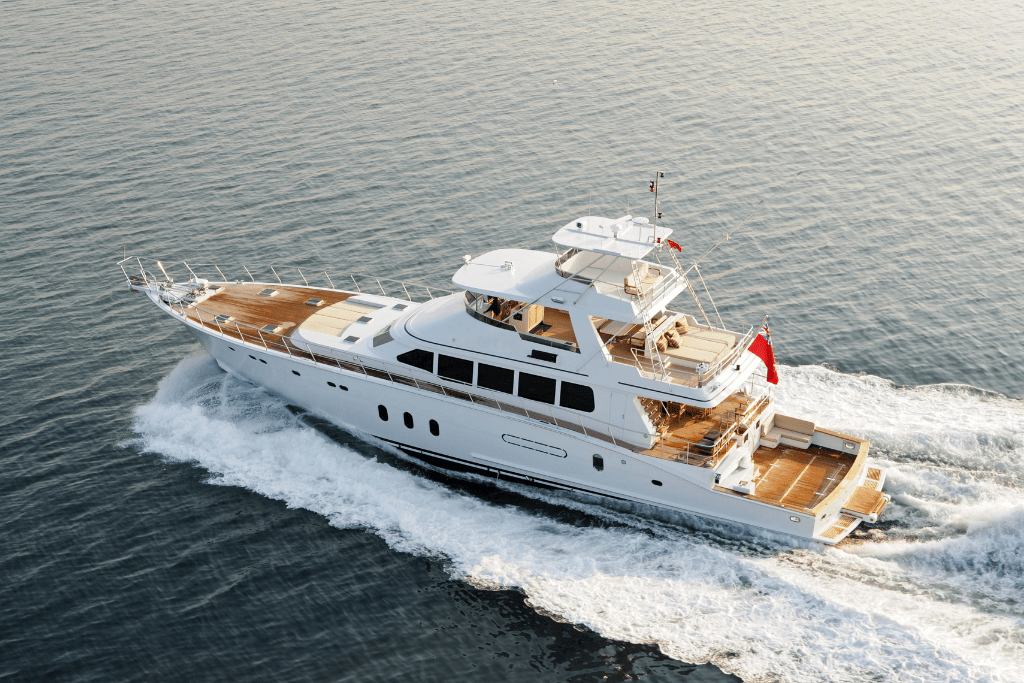Explore the dream – and the realities – of Living on a Yacht, offering insights into the freedom and challenges it entails. From financial considerations and space optimization to the impacts of weather and community aspects, it provides a balanced view to help readers make an informed decision about this unique lifestyle.
Imagine the gentle sway of waves, the endless horizon of the sea, and the allure of waking up to a different view every morning. This isn’t a holiday brochure; it’s the possibility of your new life on a yacht. It’s a dream for many, but what does it truly entail? In this exploration, we delve into the reality of yacht living. It’s not all sunsets and sea breezes. Like any home, a yacht has its charms and challenges.
For those in their prime years, considering a shift from a traditional home to a yacht is more than just a change of address. It’s a lifestyle overhaul. We’re not just talking about a snug living space or the need to be a Jack-of-all-trades at sea. It’s about embracing a unique blend of freedom and responsibility.

Our journey through this blog post is not just about painting a rosy picture. It’s about providing a realistic lens through which you can view this significant life decision. We’ll explore how this choice fits into your life puzzle, whether you’re an adventurous soul seeking the thrill of the open seas or a contemplative mind looking for serenity away from the land’s hustle.
As you read through, remember, every big decision comes with its highs and lows–like the tides. Yacht living is no exception. So, let’s set sail on this exploratory voyage to uncover what lies beneath the surface of living on a yacht.
The Allure of Yacht Living
The concept of yacht living taps into a deep-seated desire for freedom, an intimate connection with nature, and a sense of belonging within a unique community. Living on a boat isn’t just about the physical space you inhabit; it’s about the lifestyle and experiences that come with it. From the flexibility to cruise to new locations on a whim to the close-knit marina communities, yacht life offers a distinct way of living that is both challenging and rewarding.The
The Freedom and Flexibility of Location of Luxury Yacht Living
One of the most enticing aspects of living aboard a yacht is the sheer freedom it offers. Imagine having the ability to change your scenery whenever you wish. Whether it’s anchoring in a secluded bay or docking at a vibrant marina, your home is as mobile as you desire. This flexibility allows for a life unbound by the traditional constraints of geographical location.
Sailing from one destination to another, you’re not just moving your home; you’re embracing a lifestyle that allows for spontaneous adventures and experiences. The freedom to explore coastal towns, hidden coves, and open seas is unparalleled. This nomadic way of life provides a sense of liberation and adventure that is hard to find in traditional living arrangements.
Proximity to Nature and Unique Living Experiences
Living on a yacht brings you closer to nature in a way that few other lifestyles can. The rhythm of the waves, the panoramic ocean views, and the ability to witness marine life up close become a part of your daily life. This connection to the natural world is not just visually stunning but also offers a sense of peace and tranquility.

The unique living experiences that come with yacht life are endless. From waking up to the gentle lapping of waves against the hull to enjoying sunsets over the water every evening, these experiences enrich life aboard. Each day presents an opportunity to create unforgettable memories, whether it’s swimming in crystal-clear waters, fishing for your dinner, or simply enjoying the serenity of the sea.
Overview of the Sense of Community in Marinas and Sailing Circles
One might think that living on a boat could be isolating, but the reality is quite the opposite. Yacht marinas and sailing communities are often vibrant and welcoming. When you dock or anchor your yacht, you’re not just stopping at a place; you’re becoming part of a community. These communities are characterized by shared experiences, mutual assistance, and a common passion for the sea.
Life in a marina is rich with social interactions. Fellow liveaboards and sailors form a tight-knit community, often gathering for shared meals, group excursions, or simply exchanging stories and advice. This camaraderie is a significant part of the allure of yacht living. The sense of belonging is palpable, as everyone shares a common understanding of the joys and challenges of life at sea.
The community extends beyond the physical confines of the marina. Sailing circles worldwide are connected by a shared love for cruising and exploration. Whether it’s through organized regattas, informal meet-ups, or online forums, these connections foster a sense of global community. Sailors often form lasting friendships, bound by their shared experiences and adventures at sea.

Marinas often host events and activities that further strengthen these bonds. From educational workshops to social gatherings, there is a sense of collective growth and enjoyment. Living at a marina or being part of a sailing community isn’t just about having a place to dock your boat; it’s about being part of a supportive and engaging network that enriches your life aboard.
If you’re considering taking this step into yacht life, you may want to consider a test run. Charter a private yacht and try this lifestyle out for yourself. You may even decide you prefer renting over buying. Rent one model today, and then — when your mood or plans change — change the yacht for rent. You don’t have to commit right away, this isn’t a marriage, it’s a yacht.
Space and Design: Adapting to Yacht Interiors
Transitioning to live on a boat full-time introduces a unique set of challenges and opportunities, particularly when it comes to space and design. Yacht interiors, whether in a luxury yacht or a modest sailboat, require thoughtful planning and clever solutions to make the most of the available space. This section delves into the art of maximizing space, the crucial role of organization, and the myriad ways you can personalize your floating home.
Maximizing Limited Space: Innovative Design Solutions
The key to successful boat life lies in efficiently utilizing the limited space. Every square inch on a boat counts, and making the most of this space is vital for comfortable living. Design solutions often involve multi-functional furniture, such as beds with storage underneath, foldable tables, or convertible seating areas. These innovations allow for a practical living environment without sacrificing comfort or style.

Another aspect is the strategic use of vertical space. Wall-mounted shelves, hanging organizers, and overhead storage can free up valuable floor space. In a sailboat, for example, the interior can be designed with built-in storage in unexpected places like under the stairs or in the hull. This approach ensures that every part of the boat is utilized effectively.
The type of boat also plays a role in how space can be maximized. For instance, catamarans typically offer more living space compared to monohulls, making them a popular choice for those looking to move aboard full-time. Regardless of the boat type, the goal is to create a space that is both functional and comfortable.
The Importance of Efficient Organization When Yachting
Living on a boat full-time demands a high level of organization. The limited space means there’s little room for clutter, making it essential to keep everything in its place. Efficient organization not only makes life on board more comfortable but also ensures safety when the boat is in motion.
Organizational strategies include using containers and baskets to keep items secure, labeling storage areas for easy access, and regularly decluttering to avoid accumulating unnecessary items. This discipline in organization extends to all aspects of boat life, from the kitchen and living areas to personal belongings and maintenance tools.
Boat insurance policies often require certain safety standards to be maintained,
and a well-organized boat is more likely to meet these requirements. Keeping equipment properly stored and accessible can be critical in emergencies. Additionally, an organized interior can help in reducing the overall cost of living on a boat, as it prevents damage and loss of items, which could be costly to replace.
Customization Options for Personalizing Your Space
Turning a yacht into a home involves more than just functional adjustments; it’s about infusing your personality into the space. Customization allows boat dwellers to create an environment that reflects their style and preferences, adding to the enjoyment of luxury yacht living.
Personalizing a yacht interior can range from choosing color schemes and fabrics to selecting artwork and – perhaps – some nautical-themed decorative items. Many boat owners opt for a full tour of customization, tailoring each aspect of the yacht to their liking. This could include custom-built furniture, unique lighting fixtures, or bespoke floorings, such as teak or bamboo.
For those living on a sailboat, customization might mean optimizing the layout for sailing efficiency while also creating a cozy, livable space. This could involve installing custom cabinetry that fits the boat’s contours or adding personal touches like cushions and throws that make the space feel like home.

Customization also extends to technological upgrades. Modern yachts can be equipped with advanced navigation systems, entertainment setups, and climate control, enhancing the overall experience of boat life. These modifications not only add comfort but also can increase the boat’s value.
In essence, adapting to yacht interiors is a blend of practicality, organization, and personalization. Whether you’re planning to move aboard a sailboat or a luxury yacht, these elements work in harmony to create a living space that is not just functional but truly feels like home.
Climate Considerations When You Live on a Boat Full-Time
The climatic conditions of the chosen residence place or travel route are not the most obvious factor which must be noted. Being in a city apartment or a private house, we don’t think much about the weather outside the window. If a strong wind blows outside, heavy rain falls or the temperature suddenly drops, we will feel almost nothing.
On a yacht, the weather does not just play an important role, your safety and comfort directly depend on it. Each boat is individual and suitable for certain climatic conditions. It is worth analyzing all the characteristics of the boat in advance and honestly evaluating its capabilities in order to accurately determine whether it is possible to live on a yacht all year round in your chosen water area.
Financial Considerations: The Cost of Yacht Life
Embarking on the journey of yacht life involves more than just adapting to a new way of living; it also requires a clear understanding of the financial implications. While it’s easy to romanticize the idea of sailing around the world or living full-time on a boat, the reality comes with its own set of financial responsibilities. From the initial purchase of the boat to ongoing expenses and the comparison to traditional homeownership, understanding these costs is crucial for anyone considering this lifestyle.
Initial Investment: Purchasing and Outfitting a Yacht
The first step in yacht life is acquiring the right boat. This involves not only finding the best boat that suits your needs but also managing the financial investment it requires. The cost of a new boat can vary widely, depending on factors such as size, brand, and features, some of which we covered above. Choosing to live on a larger boat or a luxury cruiser naturally involves a higher initial investment.
In addition to the purchase price, outfitting a yacht for full-time living is a significant consideration. This may include upgrading boat systems, adding navigation equipment, and customizing the interior to make it livable. Even if you opt for an old, more affordable boat, it could require substantial investment in renovations and upgrades.
Furthermore, acquiring the necessary knowledge and skills for yacht maintenance and sailing is part of the initial investment. This might entail sailing courses, safety training, and learning about the nautical aspects of yacht care.
Ongoing Expenses: Maintenance, Docking Fees, Insurance
Once you own a yacht, the financial commitments continue. Boat maintenance is an ongoing requirement and a crucial part of life aboard. The yacht owners will need knowledge and skills to keep the yacht in good condition. Regular upkeep ensures the safety and longevity of your boat. This includes everything from engine maintenance to hull cleaning and can vary greatly in cost, depending on the age and condition of your boat.

Docking fees are another significant expense, especially if you choose to stay at marinas. The cost can vary based on location and the services offered. Additionally, a dinghy might be necessary for transportation to and from the shore, adding to the expenses.
Insurance is an essential consideration for any boater. Boat insurance policies can be complex and vary greatly in coverage and cost. It’s crucial to have a comprehensive policy that covers potential damages and liabilities, especially when living on a boat full-time.
Comparing the Cost of Living to Traditional Homeownership
When contemplating yacht life, it’s common to wonder if you’ll save money compared to traditional homeownership. The answer depends on various factors, including the type and size of the boat, the chosen lifestyle, and where you plan to dock or anchor.
Annual costs for yacht living can include maintenance, insurance, docking fees, and fuel, which can be comparable to or even exceed the costs of owning a home. However, some expenses, like property taxes and certain utilities, may be lower or non-existent.

It’s also important to consider the value of the experience and lifestyle when comparing costs. Yacht life offers a unique set of experiences and freedoms that traditional homeownership cannot provide. While the financial aspect is crucial, the decision to live on a yacht often goes beyond mere economics.
Living on a boat full-time can also mean a shift in priorities and lifestyle choices. For some, this means downsizing and simplifying life, which can lead to reduced overall living expenses. However, for others, particularly those choosing a luxury yacht or a larger boat, the costs can be comparable to or even exceed those of a high-end terrestrial home.
Challenges and Downsides of Full-Time Living on a Boat
Living on a yacht presents a unique set of challenges and downsides that are important to consider before making the leap into this lifestyle. While the idea of living on a boat may evoke images of endless sunsets and tranquil waters, the reality can be quite different. Factors such as weather dependency, limited access to facilities, and the psychological impacts of isolation and confined spaces play a significant role in day-to-day life on a yacht.
Weather Dependency and Its Impact
One of the most significant challenges of living on a yacht is the constant need to be mindful of the weather. Your entire life becomes closely tied to weather conditions, which can change rapidly and without warning.
- Safety Concerns: Severe weather can pose serious safety risks. Being caught in a storm while at sea can be dangerous, and even when docked, high winds and waves can cause damage to your yacht.
- Lifestyle Adjustments: Daily activities and travel plans often have to be adjusted according to the weather. This can mean being stuck in a location longer than planned or missing out on certain experiences.
- Constant Vigilance: Living on a yacht requires a high level of awareness and knowledge of weather patterns. This can be mentally taxing, as one always needs to be prepared for the possibility of changing plans or taking emergency precautions.

Remember the old saying, “Red sky at night, sailors delight. Red sky in the morning, sailors take warning!”
Limited Access to Certain Facilities and Services When You Live on a Yacht
Another downside of yacht life is the limited access to facilities and services that are often taken for granted on land.
- Healthcare and Emergency Services: In remote areas, access to healthcare and emergency services can be limited or delayed. This can be a concern for those with medical conditions or in case of accidents.
- Utility Services: Services like high-speed internet, electricity, and plumbing work differently on a yacht and may not always be reliable. This can affect both work and daily living.
- Convenience and Shopping: Getting groceries or finding specific supplies can be challenging, especially when anchored away from urban centers. This requires careful planning and often means you can’t have everything you want when you want it.
Dealing with Isolation and Confined Spaces When Living Aboard a Boat
The psychological aspects of living on a yacht are often overlooked, yet they are crucial for a sustainable life at sea.
- Isolation from Society: While some seek solitude, prolonged periods of isolation can affect mental health. Being away from family, friends, and the wider community can lead to feelings of loneliness.
- Small Living Quarters: The confined space of a boat can be challenging, especially for those used to larger living spaces. It requires adjustments in both physical belongings and mental preparedness for close-quarters living.
- Cabin Fever: Spending extended periods on a boat, especially during bad weather when you can’t leave, can lead to a sense of restlessness or cabin fever. This is where the small space and isolation can compound to impact mental well-being.
While living on a yacht can be an incredibly rewarding experience, it’s important to acknowledge and prepare for the challenges and downsides. Understanding the realities of weather dependency, limited access to amenities, and the psychological effects of isolation and confined spaces is crucial for anyone considering making a boat their home. These factors are integral to life at sea and require careful consideration and planning to ensure a fulfilling and sustainable lifestyle on the water.
Summary and Key Takeaways
Living on a yacht is a dream many aspire to, but it’s essential to approach this lifestyle with a well-informed perspective. This article has journeyed through the various facets of yacht living, weighing both its enchanting appeal and the pragmatic realities.
Recap of the Pros and Cons
- Pros: The freedom to explore new horizons, the intimacy with nature, and the unique sense of community in marinas and sailing circles are among the most compelling benefits. The ability to customize your living space and the adventure that comes with a nautical lifestyle are undeniably attractive.
- Cons: However, these benefits are balanced by challenges such as weather dependency, limited access to facilities and services, and the psychological impacts of living in confined spaces. Financial considerations, including the initial investment and ongoing maintenance costs, are significant.

Making a Well-Informed Decision
Deciding to live on a yacht should not be made lightly. It’s a decision that requires thorough consideration of both the financial implications and the lifestyle changes. Prospective yacht dwellers should research extensively, speak with experienced individuals, and realistically assess their readiness for such a commitment.
Final Reflections on Embracing the Yacht Lifestyle
For those who find the allure irresistible, yacht living can be incredibly rewarding. It offers a unique way of life that blends adventure with simplicity, freedom with responsibility. If approached with careful planning and realistic expectations, living on a yacht can provide an enriching and fulfilling experience.
Please note that the information provided in this article is for informational purposes only and should not be considered professional advice. Prospective yacht owners are encouraged to consult with qualified professionals for specific advice related to legal, financial, and practical aspects of living on a yacht.

